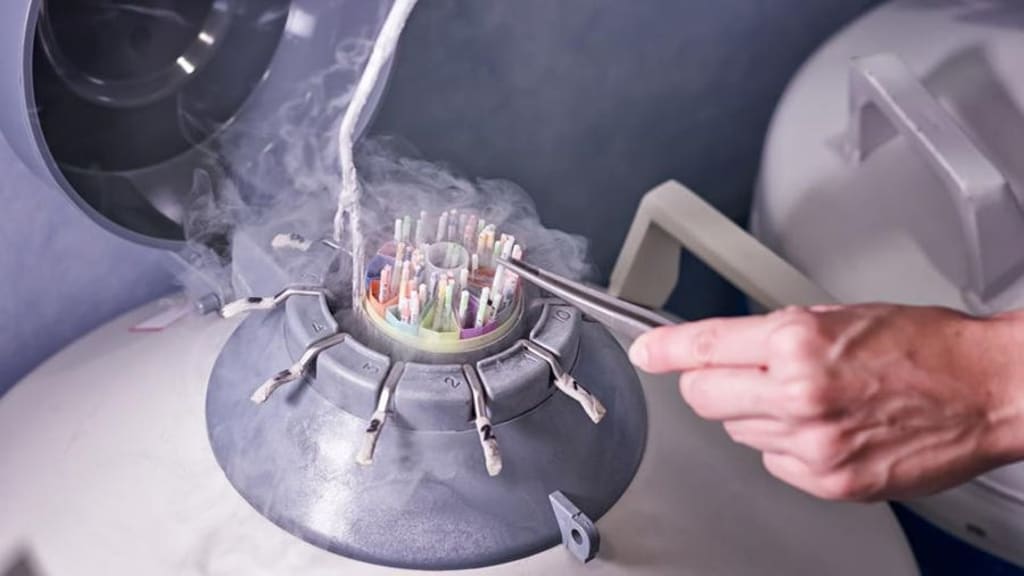Everything You Need to Know About Freezing Sperm
Discover the Benefits, Process, and Success Rates of Sperm Cryopreservation

Freezing sperm is a process that involves preserving sperm cells at ultra-low temperatures for future use. This process has become increasingly popular in recent years, as it offers a range of benefits to both men and couples looking to conceive. In this article, we will discuss everything you need to know about freezing sperm, including the benefits, process, and success rates.
Benefits of Freezing Sperm

There are several reasons why someone may choose to freeze their sperm. These include:
Preserving Fertility: Freezing sperm is an excellent option for men who want to preserve their fertility for future use. This may be due to various reasons, such as undergoing medical treatment that may impact fertility or planning to delay having children.
Overcoming Infertility: For couples struggling with infertility, freezing sperm can be a lifesaver. This process allows men with low sperm count or motility issues to undergo IVF or other assisted reproductive techniques.
Increased Chances of Pregnancy: By freezing sperm, couples undergoing fertility treatment can increase their chances of pregnancy. This is because multiple attempts can be made using frozen sperm, thereby increasing the odds of fertilization.
The Process of Freezing Sperm
The process of freezing sperm involves several steps. These include:
Sperm Collection: The first step in the process is collecting the sperm sample. This is usually done through masturbation, but other methods such as electroejaculation or surgical sperm retrieval may also be used.
Sperm Preparation: Once the sperm is collected, it is prepared for freezing. This involves separating the sperm from the seminal fluid and adding a cryoprotectant solution to protect the sperm during the freezing process.
Freezing: After preparation, the sperm is frozen in liquid nitrogen at a temperature of -196 degrees Celsius. The sperm can be stored for an indefinite period and thawed when needed.
Cost
The cost of freezing sperm can vary depending on the location and the clinic. On average, the cost of sperm freezing ranges from $500 to $1000 per year. Additional fees may apply for sperm analysis and storage. Some insurance companies may cover the cost of sperm freezing, so it's worth checking with your provider.
Risks
Freezing sperm is generally considered safe, with very few risks. However, there is a small risk of damage to the sperm during the freezing and thawing process. Additionally, there is a small risk of transmitting genetic diseases through the sperm. It's important to discuss any potential risks with a fertility specialist before proceeding with sperm freezing.
Storage
Sperm can be stored for an indefinite period, as long as it is stored in liquid nitrogen at -196 degrees Celsius. Sperm can be stored at fertility clinics or sperm banks. Some clinics offer a remote storage service, which allows the sperm to be shipped to another location if needed. It's important to check the storage policies of the clinic or sperm bank to ensure that your sperm is being stored safely.
Thawing
When the time comes to use the frozen sperm, it will need to be thawed. Thawing the sperm involves slowly warming it to room temperature. The sperm may be washed or spun to separate it from the cryoprotectant solution. The thawed sperm can then be used for IVF or other assisted reproductive techniques.
Success Rates
The success rates of using frozen sperm vary depending on several factors, such as the quality of the sperm and the technique used. However, in general, using frozen sperm has a success rate similar to using fresh sperm. According to the American Society for Reproductive Medicine, the success rates for using frozen sperm in IVF procedures are around 30-40%.

FAQs
Who can benefit from freezing sperm?
Men who want to preserve their fertility for future use, couples struggling with infertility, and those undergoing medical treatment that may impact their fertility can benefit from freezing sperm.
What is the process of freezing sperm?
The process of freezing sperm involves collecting the sperm, preparing it for freezing by adding a cryoprotectant solution, and then storing it in liquid nitrogen at -196 degrees Celsius.
What are the benefits of freezing sperm?
Freezing sperm can help preserve fertility, overcome infertility, and increase the chances of pregnancy in couples undergoing fertility treatment.
What is the success rate of using frozen sperm in fertility treatments?
The success rate of using frozen sperm in fertility treatments varies depending on several factors, but it is generally similar to using fresh sperm. The success rate for using frozen sperm in IVF procedures is around 30-40%.
How long can sperm be stored?
Sperm can be stored for an indefinite period as long as it is stored in liquid nitrogen at -196 degrees Celsius.
What are the risks associated with freezing sperm?
There are very few risks associated with freezing sperm, but there is a small risk of damage to the sperm during the freezing and thawing process. There is also a small risk of transmitting genetic diseases through the sperm.
How much does sperm freezing cost?
The cost of sperm freezing can vary depending on the location and clinic, but on average, it ranges from $500 to $1000 per year.
How is sperm thawed?
Sperm is thawed by slowly warming it to room temperature. It may be washed or spun to separate it from the cryoprotectant solution before use in fertility treatments.
Conclusion
Freezing sperm is a safe and effective way to preserve fertility and overcome infertility. The process involves collecting the sperm, preparing it for freezing, and then storing it in liquid nitrogen at -196 degrees Celsius. The cost of sperm freezing can vary, but it may be covered by insurance. There are very few risks associated with sperm freezing, but it's important to discuss any potential risks with a fertility specialist. If you are considering freezing your sperm, speak to a specialist to determine if it is the right option for you.
Resources:






Comments
There are no comments for this story
Be the first to respond and start the conversation.